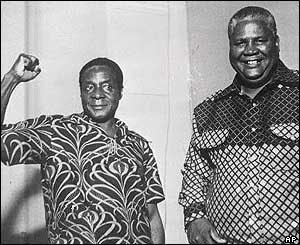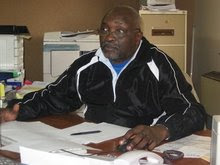
By Rev Mufaro Stig Hove
www.zimfinalpush.blogspot.com (NB: VARIOUS ERRORS HAVE BEEN CORRECTED!)@@@>>> PLEASE CLICK HERE TO LISTEN TO "SWRADIOAFRICA"'s TERERAI KARIMAKWENDA WITH DR JOHN MAKUMBE, LAWYER GABRIEL SHUMBA AND MR PEDZISAI RUHANYA DISCUSSING 'DEMOCRACY'! PRELIMINARY REMARKS:
In all my previous writings I have concentrated on the problems afflicting the nation of Zimbabwe. That is as it should be since that sad part of the world continues to sink deeper and deeper into a serious, bottomless abyss and all pens should face in that direction.
This time, however, I would like to question the world's very interpretation and implementation of the concept of Democracy. Then I will end up at Zimbabwe and South Africa asking ZANU-PF and the ANC in South Africa certain pertinent questions!
Since I was young, I've always been told that Democracy was a Government "of the people, by the people and for the people."
This sounded fair and logical.
Before the concept of Democracy, there were various forms of Government where kings and their knights and soldiers ruled the peasants and the ordinary person had no say in the running of the affairs affecting him/her.
This was not right because the common man paid taxes and worked hard to sustain the State but could not contribute in determining the direction of Government. All modern Democracies were once Monarchies of one sort or another and detail is not necessary in this particular submission.
WHAT THEN IS "DEMOCRACY"?
The word "demos" means "people." So Democracy is a Government where the people are supposed to fully participate and benefit.
When the colonisers partitioned Africa for themselves, they governed Africa from their European capitals and to them the Africans knew nothing about the complexities of modern society and hence were supposed to be satisfied with being ruled by their white masters.
Disgruntlement did arise and "winds of change" blew across Africa as the indigenous black man shouted for "one man, one vote." Ian Smith's Rhodesia had a qualified franchise where black people with certain qualifications were allowed to vote. The assumption was that a certain level of Education (eg GCE "O" Level) helped a person to appreciate the complexities of running a Modern State and therefore could make informed decisions.
The same qualified franchise had people who owned properties of a certain value incorporated into the Voters' Roll. The thinking was that these people had a stake in the Economy of the country and could be trusted to make responsible judgements and decisions.
I'm not evaluating the pros and cons.
I'm only relating things as they were in Smith's Rhodesia.
So the ZANLA and ZIPRA fighters in Zimbabwe (just like the MK fighters in South Africa) then fought for "one man, one vote."
In 1980, Zimbabweans voted in that simple "one man, one vote" Election and it is generally believed that Robert Mugabe and his ZANU-PF won the majority of the vote (getting 57 seats out of 80 reserved for blacks, Dr Joshua Nkomo getting 20 and Bishop Muzorewa getting the remaining 3.) The 20 seats reserved for whites all went to Ian Smith's Rhodesia Front.
This was not a true reflection of the situation because the whites benefited from the Lancaster House Agreement which took them as a single block and give them 20% of the Parliamentary seats. This benefit was to fall away after 10 years ie in 1990.
Prime Minister Robert Mugabe included members of Dr Nkomo's ZAPU and Ian Smith's Rhodesia Front into his Cabinet. Ministers eg of Agriculture, Health and Finance were from the former RF (Mr Dennis Norman, Dr Timothy Stamps etc.)
From ZAPU we had Dr Joshua Nkomo as Minister of Home Affairs and others like Cde Josiah Chinamano, Cde Joseph Msika etc heading various other Ministries.
The point I'm driving to is: That Government of "National Unity" was very much inclusive and was a great step forward to move away from the ugly scenes of the war. There was great potential to build on that foundation for a future Zimbabwe.
How ZAPU members were expelled from that Government of National Unity and the subsequent terrible Matabeleland and Midlands Massacres is not the subject of this particular submission. Details of that can be got at www.gukurahundi.blogspot.com and other articles whose links can be found at www.finalpushzim.blogspot.com . (An important source document is the letter written by Dr Joshua Nkomo to the Prime Minister Robert Mugabe in 1983. This 117-point letter was written from Britain since Dr Nkomo had to flee for his life during those tumultuous times from 1982 to 1987. The link to that letter can also be got at www.finalpushzim.blogspot.com .) The South African experience also has negotiations that led to Democracy and to the first Democratic Elections in 1994. So "one man, one vote" was implemented in SA in 1994 and has been with us ever since.
But let me go back to the question: WHAT IS DEMOCRACY?
The simplest definition of Democracy is a Government "of the people, by the people and for the people." My question, therefore is: If Party X gets 65% of the votes and has 65% of the Members in National Parliament, does that mean Party X should have a 100% per cent right in the running of the affairs of State?
If Party X runs the country with a 100% per cent right, then it means for the duration of that scenario, 35% of the Electorate do not enjoy Democracy. You may say the 35% have MPs in the National Parliament but in reality what is prevailing at that particular time is not a Government "of the people" unless if you say that only the "majority" are the people as defined by the expression.
This looks unnecessary but it affects how those very "majority" run the country. The attitude of "we/they" makes it impossible for the other "smaller parties" to make positive contributions while "not in Government." That "we/they" posture is not only bad for the running of the country but it is also unnecessary and can be avoided.
They will "oppose", yes; but their productive energies will be "reserved" for the time when they will also be in Government and more often than not that time never comes. Some like the late Rev Jonas Savimbi, will then go into the bush and will cause many to die and may themselves even perish in that same bush.
WHERE IS DEMOCRACY PRACTISED IN THE WORLD?
I would like to allege that there is nowhere under the sun where Democracy is practised.
The definition is: "A GOVERNMENT OF THE PEOPLE, BY THE PEOPLE AND FOR PEOPLE." The State has three main arms ie the Executive, the Legislature and the Judiciary. In the case of the USA, if the Democrats get 51% of the votes in their Presidential Elections then their candidate becomes the Executive President. Who then appoints the equivalent of their Cabinet ie the Secretaries of State, of Defence, etc? Will members of the other Parties get Executive positions?
If 49% of the people are being governed by the other 51% that's not Democracy!
The 49% are in the definition of "people" and must be a part of "Government." The fact that they are part of the Legislature is not enough. They can still be continually outvoted for as long as the 51% want to ignore their particular concerns.
I HEREBY ALLEGE THAT THERE IS NO DEMOCRACY IN THE UNITED STATES OF AMERICA.
What you have there is a form of "majority rule" but not real Democracy.
In South Africa, Mr Nelson Mandela tried to be as inclusive as possible with Mr De Klerk as one of his two Deputy Presidents. Mr Mangosuthu Buthelezi (leader of the Inkatha Freedom Party) was his Minister of Home Affairs. What was wrong with that?
Why view it as "magnanimity"? It was more than magnanimity! That is how it should always be everywhere in the world.
Leaders of sizable followings should all form the "Government of the people, by the people and for the people." Do the minorities cease to be "people" until they also get into "power"??? Am I seriously wrong? Do I need help and guidance?
In the original African setting, there were no Political Parties. But there was more of Participatory Democracy which is absent in the so-called "modern Democracies." It was not a perfect system of Government but it was more "democratic." All views could be brought through the "sub-chiefs" and ultimately the direction of Government was more inclusive of divergent views.
Today, in South Africa, we have a so-called Alliance of the ANC, the workers' organisation COSATU and the Communist Party.
Is COSATU a Political Party? Can it stand on its own and field candidates for the Presidential and Parliamentary Elections? So why is it included in the formation of Government as an Alliance Partner? The truth is that the ANC is afraid of its "constituency" and hence feels safer having them defined as some partner.
The same with Communist Party. Are they big enough to field their own Candidates? The ANC want to have them "under their armpits" so they can follow their debates and effectively "neutralize" them. The ANC, AZAPO and the Communist Party were allies in fighting Apartheid but each one had their own different visions of a liberated, democratic South Africa.
Its well and fine to call themselves Alliance Partners now but besides the ANC, do the other "partners" really have a say in the running of State affairs?
As an example, COSATU and the Communist Party are not happy with the way the ANC is handling the Zimbabwean Crisis. To what extent is their input considered since they are recognised as partners in Government? Is the partnership genuine or is it a convenient way of pacifying the views of the other Formations?
Besides the so-called Alliance Partners, South Africa has other major Political Parties such as the Democratic Alliance. To what extent are the views of the DA considered when running the affairs of the State in South Africa?
How does the ANC and its Alliance Partners hope to "transform" the economy of South Africa if such major Political Parties as the DA are only considered as some "nuisance" which will never rule South Africa. The ANC say they will rule South Africa "until Jesus comes back"? So if there is no inclusion in Government, the Alliance will have to go the direction of Zimbabwe. There is no alternative.
The poor and the unemployed will seek and get arms and wage an unofficial war against the State by blowing up ATMs, doing "cash heists" etc because there is no hope of an Economic Transformation within the set up of State structures.
Enter characters like Jacob Zuma!
He may not change the situation much but the hope is that he has the feel of the common person and will relate to their aspirations, problems etc. President Thabo Mbeki, by his very nature, is too academic and tends to associate with the advantaged and the wealthy.
Lets wait and see where SA goes in the next few years.
The Zimbabwean story is, however, more complicated.
ZANU-PF moved away from their Marxist-Leninist ideology but that they did without announcement and "fun-fare." They never announced that their noble Leadership Code was now absolute! They started acquiring wealth, farms and mines for themselves and were trying to compete with the very "capitalists" that they had abhorred in the first place.
Worse still, they used the very resources they were receiving from Britain to buy farms for themselves and their families and forgot the "masses" that they had claimed to liberate.
The very War Veterans of the 70s war had to threaten to climb the walls of "State House" to get some assistance while a secret fund was operating where the Senior "Chefs" eg Mai Teurai Ropa Mujuru, Oppah Muchinguri, etc were claiming 95% disabilities and getting millions of dollars. (At that time the Zim dollar was equal in value to the South African rand.)
ZANU-PF then got the shock of their lives when the Workers' Movement under Gibson Sibanda, Morgan Tsvangirai and others developed into a formidable force to reckon with. The story of events from 1999 to the present can be got from numerous other submissions.
The most concise one is the one entitled "The Story of the MDC: 1999 to 2006) and the link thereof can be found at www.finalpushzim.blogspot.com . What was completely unfortunate was ZANU-PF's failure to respect and do dialogue with this Movement which had attracted millions across the economic, social, racial and political divide. Although the MDC was ideologically unclear, it became and continues to be a head-ache in Zimbabwean Political Affairs.
When the MDC Leader, Mr Morgan Tsvangirai, said in 1999: "What we want to tell Mugabe today; go peacefully, or we will remove you violently" the farm invasions had not started. So he was not referring to the farm invasions. So what was he referring to? How could he refer to things that had not yet been even planned?
The tragedy of the Zimbabwean story is the failure (mostly deliberate) to access each aspect very thoroughly. There are too many half-truths and outright lies.
I have referred to the Zimbabwean tragedy mainly because ZANU-PF should have managed the coming of the MDC in a different manner. If ZANU-PF believed in Democracy sincerely, they should have privately engaged this new "kid on the block." Unfortunately ZANU-PF thought they would treat the MDC exactly as they treated Margaret Dongo's ZUD, Edgar Tekers's ZUM, Dr Joshua Nkomo's PF-ZAPU etc etc.
Now the problem is completely out of control!
Zimbabwean Professors across the globe write and shout that Mugabe and ZANU-PF must go! Some actively call for uprisings against that Regime!
So all these millions who shout against Mugabe: are they all "sell-outs"? Interestingly the Communist Party of South Africa once visited Harare and asked ZANU-PF why their "revolution" was not accepted by strategic sectors of the Zimbabwean society. (Please visit www.zimfinalpush.blogspot.com and see on the December 2007 archives the article in question.) What many intellectuals in the world fail to see is the very composition of the MDC. The MDC is made up of various disgruntled forces. I have tried to highlight the complexity of the Zimbabwean Crisis in a submission entitled "Why the SADC/Mbeki initiative cannot and will not solve Zimbabwe's problems." (The link thereof can be got as one scrolls down www.zimfinalpush9.blogspot.com). Alernatively you can "google search" that very header and you will see that it was captured by main sites throughout the world. What I'm trying to say is that Robert Mugabe and ZANU-PF "blew it" completely. The issue is no longer about the 4500 white farmers who were beaten up, murdered and evicted from the land they had developed over many years.
The issue was no longer about Zimbabwe's sovereignty which we all know came in 1980.
The issue was no longer about Britain and the USA which allegedly had not completed paying for the acquiring of more land for re-settlement. (They did well to renege, if they did renege: for who was benefiting anyway from the land that had been acquired in the first 20 years?)
The issue was no longer about sanctions (real or imagined) which the so-called "West" allegedly visited upon the "revolutionary Mugabe and ZANU-PF."
The issues are now bigger!
All who suffered in this way or that way under way under Mugabe and ZANU-PF are shouting "Mugabe must go!"
Josiah Tongogara's relatives and those (like us) who held him in high esteem are shouting, "Mugabe must go!"
The relatives of the young, pretty Ms Rashiwe Guzha (who disappeared at the President's very office and whose body has not been located up to now) are shouting, "Mugabe must go!"
All those who suffered and lost loved ones during that dark era of "Gukurahundi" in the Midlands and Matebeleland are shouting, "Mugabe must go!"
All those whose humble dwellings were destroyed during the ZANU-PF madness of "Murambatsvina" are shouting, "Mugabe must go!"
The list is endless!
A few faint voices like that of the Australian-based Reason Wafawarova are singing Robert Mugabe's praises.
The battle lines are clearly drawn!
ZANU-PF is afraid of the Diaspora Vote because that vote will sweep them away just like their infamous "Gukurahundi" and "Murambatsvina" Operations. So ZANU-PF wants the Foreign Currency earned by the Diasporians but does not respect their legitimate right to vote just because the Diasporians (besides Reason Wafawarova and Kuthula Matshazi) are mainly MDC.
So there is no hope for ZANU-PF! If they "win" the 2008 Elections with their various tricks: intimidation, violence and rigging; a more radical method will be used to remove them.
The nearest to my mind are either:
1. An invasion by some sympathetic force or set of forces.
2. A properly executed uprising (the Final Push.)
3. Or properly trained guerrilla fighters drawn from the millions who are suffering various tribulations in the Diaspora.
The blasting of a few bridges beginning with the very ones across the Limpopo will work wonders in the ending of this stupid man-made crisis in Zimbabwe
WHERE DID ZANU-PF GO WRONG?
They thought Democracy was "of ZANU-PF, by ZANU-PF and for ZANU-PF."
Here is a reminder to Mugabe (originally known as Matibili) and ZANU-PF; DEMOCRACY IS "OF THE PEOPLE, BY THE PEOPLE AND FOR THE PEOPLE!"
The people include those members of other Political Parties, as well!
I hope the ANC in South Africa are taking notes for their own experience!
Respectfully submitted,
Rev Mufaro Stig Hove.
@@@@@@@@@@@@@@@@@@@@@@@@@@@@@@@@@@@@@@@@













